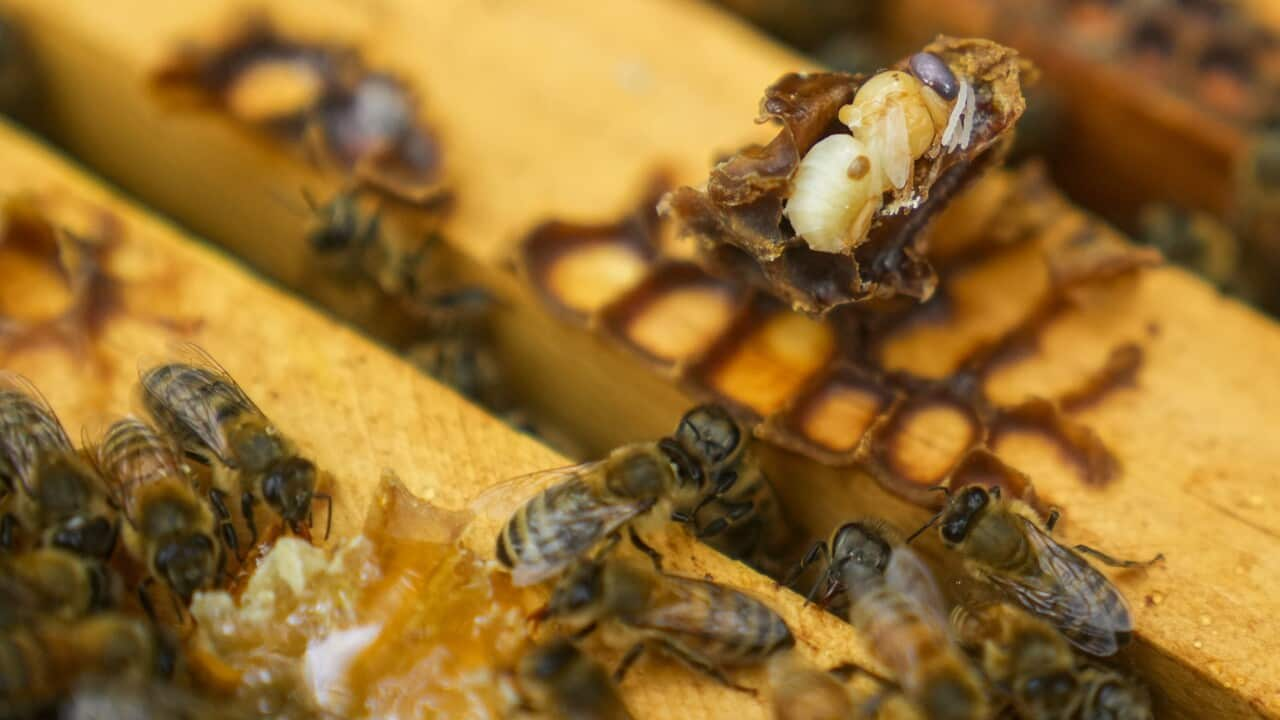Italian
Sfx
Questo è solo uno dei suoni di uno degli uccelli canori più riconosciuti al mondo.
Lo è anche questo:
Sfx
E questo:
Sfx
È anche famoso per le canzoni che possono suonare esattamente come motoseghe, allarmi per auto o altre specie di animali.
Ma l’uccello lira superbo è ancora più complesso del suo richiamo elaborato.
“They're actually an important species in ecosystems and it all comes from their ability to move huge amounts of soil when they forage for invertebrate food.”
Guidati da Alex Maisey, i ricercatori dell'Università La Trobe hanno monitorato i movimenti degli animali nell'arco di due anni attraverso le Southern Highlands del Victoria.
Maisey afferma che hanno scoperto che l'animale dissoda una media di 155 tonnellate di terreno all'anno nella sua ricerca di cibo.
“They do this by scratching through with their powerful claws and kicking the litter and soil and burying it, and by doing this a single lyrebird in the Dandenong Ranges, for example, would move an approximate amount of litter and soil that would be carried by 11 dump trucks.”
Spostando grandi quantità di materiale terrestre, gli uccelli lira cambiano il modo in cui la lettiera di foglie si decompone e la struttura del suolo delle foreste.
ll di BirdLife Australia afferma che è a causa di questo ricambio del suolo che l'animale ha un ruolo importante nell'ecosistema forestale.
“Yes the species that have evolved with lyrebirds have come to rely on them creating conditions suitable to them.”
Dooley sostiene che gli uccelli lira contribuiscono a mantenere sane anche altre specie.
“So that the lyrebirds can survive and breed and move into other areas to continue delivering services that create that rich and unique environment.”
BirdLife Australia stima che circa il 40% dell'habitat dell'uccello lira sia stato distrutto negli incendi della scorsa estate, suscitando preoccupazioni sullo stato della specie.
Il ricercatore Alex Maisey afferma che la conservazione della specie dovrebbe essere una priorità per contribuire a gestire le foreste umide attraverso i cambiamenti climatici.
English
Sfx
That's just one of the sounds of one of the world's most-recognised song-birds.
So is this:
Sfx
And this:
Sfx
It's also famous for songs that can sound exactly like chainsaws, car alarms or other species.
But the Superb Lyrebird is even more complex than just its elaborate call.
“They're actually an important species in ecosystems and it all comes from their ability to move huge amounts of soil when they forage for invertebrate food.”
Led by Alex Maisey, researchers from La Trobe University tracked the animals' movements over two years through Victoria's Southern Highlands.
He says they discovered the animal turns over an average of 155 tonnes of soil a year in its search for food.
“They do this by scratching through with their powerful claws and kicking the litter and soil and burying it, and by doing this a single lyrebird in the Dandenong Ranges, for example, would move an approximate amount of litter and soil that would be carried by 11 dump trucks.”
By moving large amounts of ground material, the lyrebirds change the way leaf litter decomposes and the structure of soil on the forest floor.
BirdLife Australia's Sean Dooley says it's because of this soil turnover that the animal plays an important role in the forest ecosystem.
“Yes the species that have evolved with lyrebirds have come to rely on them creating conditions suitable to them.”
He says they're helping to keep other species healthy.
“So that the lyrebirds can survive and breed and move into other areas to continue delivering services that create that rich and unique environment.”
BirdLife Australia estimates about 40 per cent of the lyrebird's habitat was destroyed in last summer's bushfires, raising concerns about the status of the species.
Researcher Alex Maisey says the conservation of the species should be a priority to help manage wet forests in the face of climate change.
Report by Brooke Fryer




